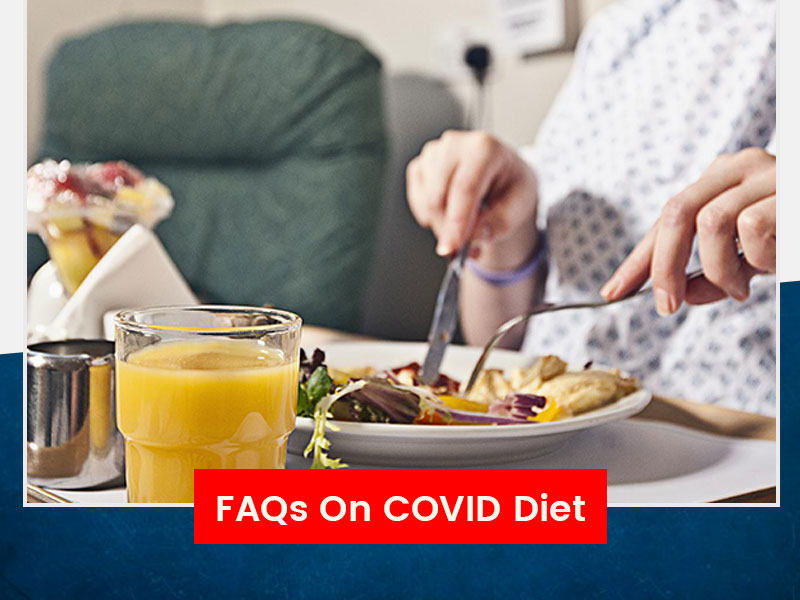
In this exclusive column today, I am sharing foods and drinks to help people recover from COVID-19 at home. Fluids, protein and high energy which are palatable to the patients are the basics of formulating a recovery plan. During illness, our bodies' requirements for food and energy are high. Nutritious meals and drinks helps in reducing inflammation in the body and provides hydration and energy needs.
Table of Content:-
1. What meals should be given to covid patients?
During inflammation our body needs meals which are high in energy and protein making calorie rich diets important at the time of recovery. When you are trying to recover, forget about any weight loss and any fad diets. Some protein and energy rich meals for recovery includes mung daal khichadi, barley khichdi, besan cheela, moong dal cheela, uttapam, suji or rava upma with ghee, oats with milk, vegetable dalia, rice kheer or vermicelli kheer, well cooked sprouts, quinoa pulao, rajgira or amaranth laddoo, jam sandwich or butter sandwich, grilled paneer, mung daal cutlets, palak paneer, scrambled eggs, omelette, dal with vegetables to name a few dishes. During this time, patients experience taste changes or loss of taste. One should make the most of this and try and feed different foods. I have purposely not added non-vegetarian meal options as they can be difficult to digest and can put one at risk of food poisoning. However, one can include well cooked chicken soup or chicken breast and thigh fillets.

Also Read: Finding It Difficult To Recover From Post-COVID Fatigue? Here Are 6 Dietary Tips To Follow
2. What can be given to increase hydration?
Hydration is essential in covid 19 care. It helps in balancing electrolytes, keeps people alert and assists in metabolic function. Fluid is one of the easiest mediums to get energy and protein into patients' diets who are unable to meet oral requirements. Some fluids include ORS, daal water, whey water, barley water, lemon ginger tea, turmeric and black pepper warm water, milkshakes ( at room temperature) with nut powders like almond, pistas and walnut powders, paneer / whey water, vegetable juices and soups, chicken stock, vegetable stock, fresh coconut water, herbal teas with honey, bone broth and plain warm water with honey.

3. Apart from medications, what are the most important supplements?
We have long emphasized the importance of Vitamin D in boosting immunity. Taking vitamin E also helps. These 2 are fat soluble vitamins so they should be taken along with the main meal or any food which has fat, for example milk or ghee or butter or nuts. Dosage vitamin D is based on the current serum levels and can be 1,000 Iu per day to 2,000 Iu per day, vitamin E can be taken 25mg per day.
- Vitamin c and zincovit are other supplements that help in building immunity. One has to note that zinc tablets should not be taken with citric acid as citric acids bind with zinc ions and interfere in its release.
- Betadine gargle - Gargle with betadine or turmeric with warm 3 times a day. This helps in throat infection and inhale with steam 3-4 times a day.
4. Some important things to keep in mind while feeding the patient?
Always, listen to patients' needs like their “likes” and “dislikes”. In COVID- 19 infection, patients experience loss of taste and smell. Also, taking numerous medications can cause taste changes. If patient can’t chew foods (because it is an effort and required more energy to chew), give them mashed potatoes with butter and milk, milkshakes, khichadi, dalia, oats, soft idli, soft mung daal cutlets, cream soups like cream of potato soup, pumpkin soup, mung daal soups, soft bread with jam and butter, burfi- like beetroot, cashew, besan burfi also help. You can add almond powder, walnut powder, pista powder, flaxseed powder, dates and milk powder to milkshakes to increase calorie intake.

5. What to do if platelets count drops?
Some people can have low platelet count at the time of infection. Research shows that papaya leaf extract helps in increasing platelet count. Papaya leaf juice of 50 ml a day with honey is given for 1- 3 days. . If you do not have papaya leaves, you can purchase papaya leaf extract in a supplement form and give it to the patient. However, I suggest consult your doctor before giving it to the patient. It should not interfere with the medications.
Also Read: What To Eat To Recover From COVID-19 Virus, Dietitian Nutritionist Swati Bathwal
6. Tips to avoid food poisoning?
In a compromised immune system especially when you are unwell, food poisoning is the last thing we would want. There are certain foods which can cause food poisoning. Unpasteurised milk, raw fish, uncooked sprouts, raw chicken or uncooked chicken, mutton, eggs, raw salads, white cheese should be avoided. Follow food safety protocols like washing hands, chopping boards.
Above, advice is a generic advice, please consult with your doctors for any specific health information for yourself.
Read more articles on Healthy Diet
Also watch this video
How we keep this article up to date:
We work with experts and keep a close eye on the latest in health and wellness. Whenever there is a new research or helpful information, we update our articles with accurate and useful advice.
Current Version